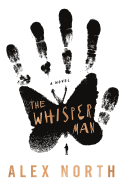
Alex North's The Whisper Man is an exemplary thriller, offering plenty of suspense, things that go bump in the night and complex psychological maneuverings that may--or may not--explain the good and the bad that is shared by fathers and sons.
As the novel opens, off-duty Detective Inspector Pete Willis wearily heads out to help search for a missing six-year-old boy. He doesn't want to think about the similarities between this case and an old one that he still can't forget. At the same time, Tom Kennedy, a successful novelist and deeply bereaved widower, is struggling to connect with his young son, Jake. A gifted but troubled child, Jake knows more about the world around him than seems natural. He tries to be good, quietly drawing by himself, but his pictures profoundly disturb Tom.
Detective Inspector Amanda Beck--a generation younger than Pete--wrestles with the case of the missing child, which does indeed turn out to be linked to the case that haunts the older detective. The serial killer, dubbed by the press "the Whisper Man," appears to have returned, although he's been in prison some 20 years; Pete was never able to pin down for certain whether there had been an accomplice. And now, there's another child-snatcher whispering to his victims before he takes them. Kids repeat the rhyme on school playgrounds: "If you leave a door half open, soon you'll hear the whispers spoken. If you play outside alone, soon you won't be going home...."
Tom and Jake have just relocated to a new village to start over, after the loss of Jake's mother. But it seems they've moved into a maelstrom of evil, like something out of one of Jake's drawings. The tension and the action ratchet up as the distant past becomes very present again.
The Whisper Man is told from a number of different perspectives, chapter by chapter--Tom, Jake, Pete and the Whisper Man himself. They are occasionally joined by others, including up-and-coming DI Amanda Beck, who looks to Pete as a mentor; but the story centers on Jake, his father and their connection to the bad guy. Tom's perspective is the only one written in first person, giving him a compelling narrator's authority-- appropriate, as he is the novelist of the bunch. These differing voices exhibit North's adeptness with character, including the precocious child's view of the world in Jake's chapters. They also give the reader a chance to sleuth alongside the professionals. But North gives nothing away: even the most mystery-savvy reader will be gasping and page-turning to the very end.
North's characters are multi-layered, deeply relatable while keenly entertaining as they reveal themselves. Pete struggles with alcoholism in a day-to-day battle that is both fraught and poignantly banal. A young man whose father didn't love him focuses on the meaning of a meal prepared with or without care. One of Tom's daily challenges involves taking Jake to school, where he waits for his son to look back over his shoulder or not, and where he worries about fitting in with the other parents (one of whom will become a significant side character). Each chapter in its turn, and each featured character, is so absorbing that the reader wishes to follow this lead and then that one--but the momentum of the plot is relentless. Characters that the reader has invested in are in danger, and the pages fly by. At nearly 400 pages, The Whisper Man is nonetheless a quick-reading, fast-paced novel.
The psychology is complex. There's more than one bad guy, blurring into one another in the eyes of frustrated investigators Willis and Beck. And if The Whisper Man has a hero, or heroes, they are imperfect, each occasionally thinking themself the villain. Whether it surfaces as evil or good intentions, there is a strong theme throughout of the connections between fathers and sons: what is passed down, and what role free will has to play.
In the end, The Whisper Man has all the hallmarks of a great murder-mystery thriller: suspense, the battle between good and evil, surprise twists and turns, fresh takes on classic detective characters and sympathetic civilians. But more than that, North offers nuance and questions about human agency. For all the darkness in this novel about serial killers and trauma, there is a sweet strain of filial love and creativity, and even a note of redemption. --Julia Kastner

